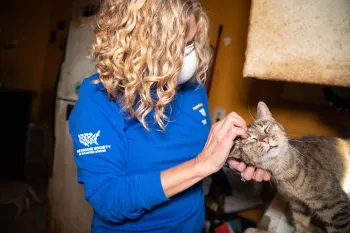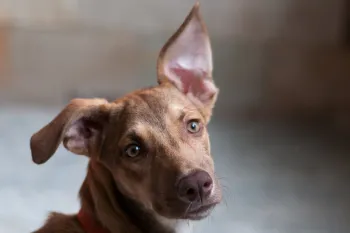We’re on a mission to make real, lasting change for animals. For over seven decades, our work has been motivated by the thought of a better world, one in which humans and animals live in harmony and no animal suffers from the actions of people. We have helped build a movement of millions of people who believe that the world will be a better place when animals are given the compassion and kindness they deserve.
As I shared earlier this week, we began as a gutsy startup in 1954, with virtually no funds but lots of heart and determination to change some of the most entrenched and systemic cruelties to animals. Our earliest campaigns centered on the United States, but our fight to end cruelty would inevitably become a global effort. And that early thought of a better world for animals has grown into a movement beyond what our founders could have imagined. Here are some highlights :
Working to end laboratory experiments on animals
In 1966, our investigations of dog dealers directly inspired the Animal Welfare Act, a landmark law in the U.S. Our efforts to reduce the use of animals in research, testing and education also included persuading the U.S. government and private laboratories to release over 1,000 chimpanzees to sanctuaries so far, changing the lives of those chimps forever. We filed a legal petition to end invasive research on chimpanzees in the U.S.—and we won.
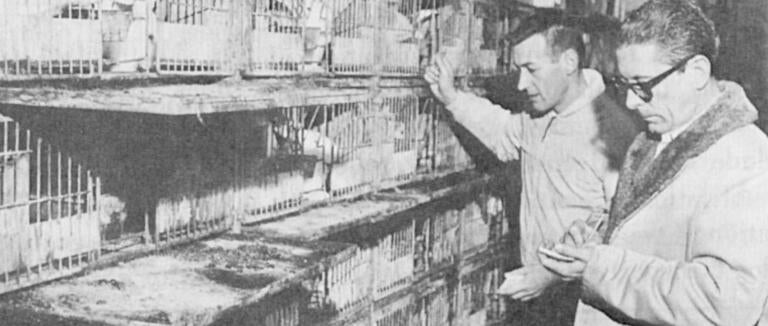
Historical Images
The progress we’ve since made in this area is encouraging. We’ve given the beauty industry a cruelty-free makeover by helping to secure legislation that limits or prohibits animal testing for cosmetics in 44 countries and 12 American states. We played a crucial role on the U.S. National Research Council committee that inspired governmental initiatives focused on the replacement of animals in toxicity testing. And worldwide, we’re leading bold collaborations that bring together corporate, academic, research funding and other like-minded partners to push for the rapid implementation of sophisticated methods that don’t rely on animal suffering to advance science or product safety.
Improving the world for companion animals
We have long recognized that close relationships with our pets are often the gateway that leads people to think more deeply about all animals. We also believe that socioeconomic struggles or lack of veterinary resources should be no barrier to this bond. So, we’ve advocated for and provided access-to-animal-care programs in underserved communities. We’re committed to building a stronger and more diverse movement from the ground up, and people who love their pets are powerful allies.
We understand that crisis situations impact both people and the animals they care about. So, we’ve led historic emergency response and recovery initiatives in dozens of nations. In the Indian Ocean basin region after the tsunami (2004) and in the U.S. Gulf Coast region after Hurricane Katrina (2005), we responded to immediate needs while executing plans for long-term recovery and reconstruction. This has shaped the model for many subsequent deployments, and we continue to make the case for animal-related preparedness and response with governments across the globe.
Our humane street dog management efforts around the world have introduced public awareness campaigns with effective spay/neuter and vaccination programs to stabilize animal populations and diminish the threat of rabies, making countless communities both safer and more compassionate.
Over the last half century, we’ve helped to substantially drive down the numbers of animals who have entered shelters and, in turn, those who are at risk of euthanasia, through education, sterilization and adoption initiatives. We’ve seen the public embrace pet adoption as a common and celebrated norm. Our current programs help equip shelters and rescue groups to address the root causes that drive pet relinquishment through spay/neuter campaigns, trap-neuter-return programs for community cats, adoption initiatives and programs that keep pets with their families. We’ve trained tens of thousands of animal welfare professionals on the innovative solutions that help improve the welfare of pets.
Our puppy mill campaign has increased enforcement action and reduced the number of breeding dogs kept in U.S. Department of Agriculture-licensed mills by one-third. That’s 32,000 dogs a year! We’ve also driven the passage of seven state and nearly 500 local ordinances to stop the sale of puppies in stores.
We have taken on some of the grimmest forms of cruelty to dogs, too. We worked with South Korean animal advocates to fight the dog meat trade in their nation—a cruelty we were told would be impossible to change. But last year, South Korea passed a law to end the dog meat trade.
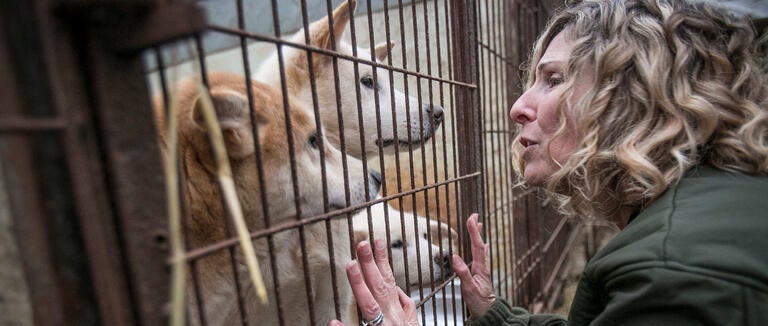
Jean Chung/Humane World for Animals
Because there’s no place for dogfighting in the world we’re trying to create, we not only work to ensure there are strong laws against it, but provide free trainings to help law enforcement investigate and prosecute it. Removing this kind of violence from communities is something that helps both humans and animals.
Ending the cruelest practices in animal agriculture
After our campaign in the mid-1950s led to the passage of the Humane Methods of Slaughter Act, our focus on factory farming took hold. Our 2008 investigation of the inhumane treatment of animals at a slaughter plant spurred the largest beef recall in history. And we led the campaign to enact Proposition 12 in California, which is considered the strongest law for the protection of farm animals in the world.
Before laws like Proposition 12, it was a largely unquestioned practice in the U.S. to keep pregnant pigs, egg-laying hens and baby cows raised for veal in cages and crates so small they couldn’t even turn around. Since then, we’ve led the way to pass similar legislation in almost a dozen states across the U.S., which taken together have reduced suffering for hundreds of millions of farm animals. Our fight for Proposition 12 even reached the Supreme Court of the United States, where our lawyers argued against a faction of the pork industry that sued to invalidate the law—and we won.
Plant-based eating is good for animals, the environment and ourselves. So, we are working around the world to advocate for a more plant-forward food system and provide awareness about the consequences of our food choices. Creating opportunities for more people to put plants at the center of their plates, instead of animal products, will dramatically lessen suffering. Our work with producers, scientists, chefs, food service companies, financial institutions and universities is changing the world for farm animals at an unprecedented scale.
Challenging the cruel treatment of wildlife
Since establishing our wildlife program in the early 1970s, we have made the case again and again that wild animals must be protected. Their lives are important, as individuals and as members of their families, communities, ecosystems and species.
In more than half a century of international treaty work, we’ve secured critical protections for so many wild species, including bears, bobcats, chimpanzees, dolphins, giraffes, lizards, manatees, pangolins, rays, sharks and whales. We’re winning in campaigns to end shark fin sales, the use of wild animals in circuses, and other threats, and we’ve fought to curtail the keeping of wild animals as pets, helping to ensure passage of the Big Cat Public Safety Act in the U.S., among other successes . In the U.S., we’ve helped to pass ballot initiatives strengthening protections for wildlife and outlawing cruel trapping and killing practices. We’ve fought to protect wolves and other apex carnivores from trophy hunting. And we continue to challenge the importation of live wild animals and animal body parts from trophy hunts, as well as rhino horn and elephant ivory and other cruel trinkets.
That’s not all. Our campaign against Canada’s commercial seal slaughter has closed most international markets for seal fur. Our work has reduced the number of seals killed each year, the value of the hunt and the number of people killing seals by more than 90%. We’re winning against the fur trade, having persuaded dozens of retailers to go fur-free and successfully overcoming deceptive mislabeling of fur products.
We played a crucial role in the adoption of the global moratorium on commercial whaling. We’ve helped hasten an end to the use of elephants in circuses and other forms of entertainment, and we have innovated new ways to mitigate human-wildlife conflicts without killing wild animals.
Building a stronger animal protection movement
For decades, we have sought to build and strengthen a worldwide animal protection movement. Among other outcomes, this has resulted in the passage of thousands of laws worldwide, leading to felony-level penalties for crimes such as animal fighting and individual acts of cruelty. It’s also established protections for companion animals, animals used in laboratory experiments, wildlife, farmed animals, horses and more.
Our legal team in the U.S. has filed hundreds of actions in state and federal courts and with administrative agencies around the country. We have won more than 100 favorable rulings for animals and drafted and defended countless new state and local laws and regulations. And through ballot measure campaigns in the U.S., we helped the pro-animal position prevail through direct votes in more than two-thirds of 61 initiatives.
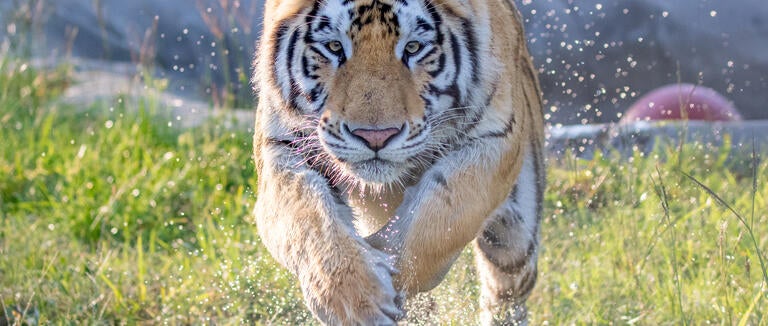
JP Bonnelly
Our work to improve practices in sheltering, care and rescue initiatives around the world is also helping to build a stronger animal protection movement. Drawing from our experience in managing our flagship sanctuary, Black Beauty Ranch, and stepping up to create and run a sanctuary for chimpanzees who had been abandoned in Liberia after their use in research, we’ve raised the bar on standards of care, culture and infrastructure in the global animal sanctuary movement.
Throughout everything we do for animals, we work daily to bring even more people into caring for this cause. We’re committed to building a stronger and more diverse movement because it is essential to the kind of world we’re trying to create.
On Friday, I will announce our next big step that will build on these achievements.


